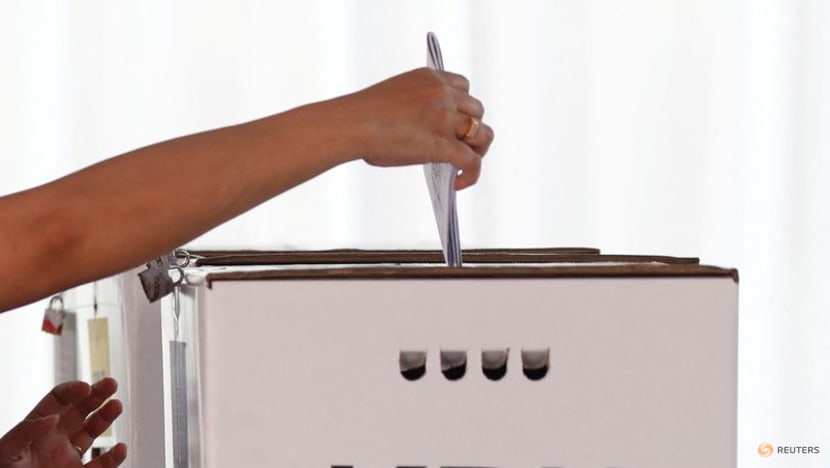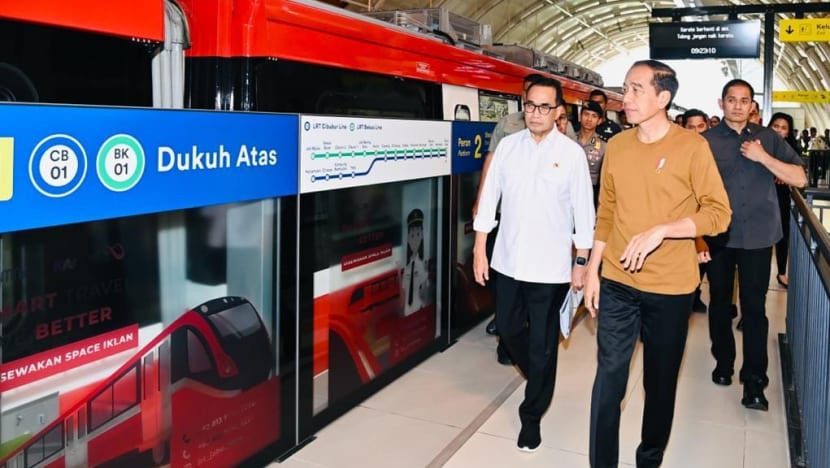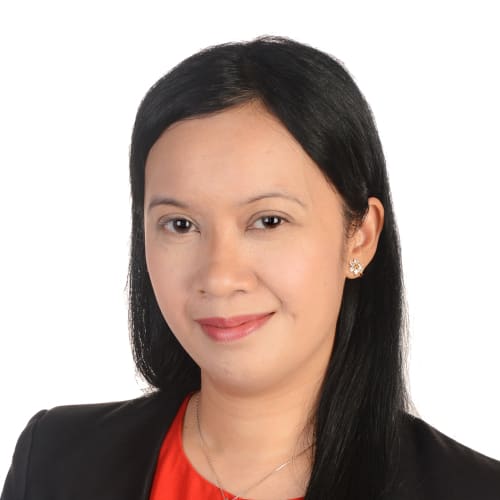5 hot-button issues set to figure strongly in Indonesia’s presidential, legislative elections
Candidates can start campaigning on Nov 28 until Feb 10 next year, before voting on Feb 14 to choose the country’s next president and parliamentarians.

FILE PHOTO: A voter casts a ballot during elections in Jakarta, Indonesia on Apr 17, 2019. (Photo: REUTERS/Edgar Su)
JAKARTA: From bread-and-butter issues to geopolitical rivalry, several issues will be the main concerns of Indonesians when they head to the polls on Feb 14 next year to elect a new president and parliament members, say analysts.
Topping the list is the state of the economy as people grapple with increased cost of living, unemployment and inflation, and how the new president will help cushion the impact through policies and schemes.
Efforts to improve connectivity within the vast archipelago of more than 17,000 islands, which will help grow the country’s economy, will also be an issue the next president must handle.
President Joko Widodo, barred from running as the constitution only allows a person to stay in power for two terms, has pushed for numerous infrastructure projects during his tenure, which voters will want to know if they will be continued under a new administration.
But during the campaign period from Nov 28 to Feb 10, candidates will likely use identity politics to attract voters through religious or racial-based rhetoric, which analysts fear could polarise communities like in previous elections.
On Thursday (Oct 19), two presidential hopefuls - namely former Jakarta governor Anies Baswedan and Central Java governor Ganjar Pranowo - and their vice-candidate picks registered themselves with the country’s general elections commission.
Presidential candidate front-runner Defence Minister Prabowo Subianto, however, has yet to name his running mate.
Indonesia’s elections come amid intense geopolitical rivalry in the region, and how the next leader plans to navigate the country in its relationships with the United States, China and other major powers will be a crucial factor for voters.
CNA explores the five hot-button issues in Indonesia’s upcoming elections.
THE ECONOMY
As a developing country with about 270 million people, the economy remains crucial in the upcoming elections.
“The top three concerns of the voters will remain the same, which are (eradicating) poverty, job opportunity, and inflation,” said Mr Kevin O’Rourke, an analyst with Jakarta-based political risk consulting firm Reformasi Information Services.
Indonesia was hit hard by the COVID-19 pandemic in 2020, with its economy contracting 2.07 per cent that year.
But it rebounded in 2021 as it grew 3.69 per cent. Last year, it even recorded a growth of 5.31 per cent, the highest in almost a decade.
However, as of March this year, there are still about 26 million poor people in Indonesia, a country of about 270 million people. This is equal to a poverty rate of about 9 per cent.
In recent weeks, Southeast Asia’s biggest economy has seen an increase in the price of rice amid harvest failure due to the current prolonged dry weather.
Jokowi, as Mr Widodo is popularly known, has been checking markets across Indonesia to ensure enough rice supply to keep the prices down.
An increase in rice prices is a recipe for higher inflation. Last year, the inflation rate was 5.51 per cent. It was just 1.87 per cent in 2021.
This year’s inflation is expected to be around 3 per cent, but it may be higher if the rice price situation does not improve.
A popular staple food, the price of rice and other cost of living will certainly be people’s main concern when they head to the polls next year.
According to the election commission, about 204.8 million Indonesians will be eligible to vote, making the next elections the world’s biggest single-day election.
More than half of the eligible voters are young voters.
Thus, tackling unemployment will likely be an issue candidates will discuss during campaigning.
“When you talk to young voters, they will definitely ask about the chances of getting employed or even landing a job as a freelancer,” said Mr Aditya Perdana, a political analyst from the University of Indonesia.
Indonesia’s unemployment rate last year was about 5.86 per cent, while this year’s rate is predicted to be around 5 to 5.7 per cent. Jokowi predicted similar figures for next year.
Related:
INFRASTRUCTURE
A major drive for the country’s economic growth is infrastructure aimed to connect the archipelago and to accelerate growth.
Jokowi has largely been praised for his efforts in building new highways, ports and airports across Indonesia, not just on the main island of Java.
During his administration, he inaugurated Sulawesi’s first railway this year, Kalimantan’s first highway in 2019, and the same year also inaugurated Papua’s longest bridge.
However, some projects have been deemed unsuccessful as they have yet to benefit locals.
This would be, for example, Kertajati International Airport in West Java and Palembang’s Light Rail Transit (LRT) in South Sumatra.
Political analyst Arya Fernandes from the Centre for Strategic and International Studies (CSIS) believes the incoming eighth president of Indonesia would need to deal with a similar problem in the lack of infrastructure and the ability to build new ones, including financing them.
“I think issues related to investment and infrastructure and their impact on Indonesia’s development will continue to be discussed in this election,” he said.

JOKOWI’S POLICIES AND PROGRAMMES
With just a year left in office, Jokowi remains popular in the world’s third-biggest democracy.
His approval rating has been consistent in the past nine years at about 70 per cent, which many world leaders could only dream about.
According to polls, how close a presidential candidate is to Jokowi also boosts the presidential candidate's popularity.
Hence, whether the person will continue Jokowi’s various policies and programmes will be in the spotlight during campaigning.
Jokowi’s top programme is moving the capital from congested and sinking Jakarta to a remote area in eastern Kalimantan.
The continuation of building Nusantara, the planned new capital, will be under scrutiny.
While the capital is expected to move next year, the completion of Nusantara is scheduled for the country’s centennial in 2045.
“Nusantara will definitely be an issue during campaigning as to how the candidates view it, how they want to build it and attract investors,” said Mr Perdana from the University of Indonesia.
Jokowi also has several popular populist welfare schemes that candidates may want to continue or change.
“The continuation of Widodo’s social welfare support funding has marked a big change, and which of the candidates will continue to implement it effectively will be an issue,” said Mr O’Rourke from Reformasi Information Services.
Jokowi’s welfare schemes range from providing cash handouts, especially during the early days of COVID-19, to providing social assistance specifically targeted for the poor.
IDENTITY POLITICS
How religious a candidate appears to be or which religious leaders back which candidate will also be a theme during the campaign season.
Known largely as identity politics, analysts believe religion, especially Islam, will play a major role in the elections of the world’s biggest Muslim-majority country.
“Political identity will remain a buzz term during the campaigning whether this is something the candidates will be using or what voters hope they won’t use,” said Mr Perdana.
During the previous presidential and legislative election in 2019 between Jokowi and now Defence Minister Prabowo Subianto, who is running again, identity politics was used even though both were Muslims.
It was also a point of contention during Jakarta’s gubernatorial election in 2017 between Christian incumbent Basuki Tjahaja Purnama and of Arab-descent Anies Baswedan, now a presidential candidate.
Mr Perdana pointed out that even before campaigning for the upcoming election has started, former Central Java Governor Ganjar Pranowo, one of the presidential candidates, has been featured in a national television station's call to prayer video, raising eyebrows.
Amid criticism, the TV station, whose owner Hary Tanoesoedibjo heads the non-parliamentarian political party Perindo that is backing Mr Pranowo, said there is nothing wrong with it as the presidential candidate is indeed Muslim. Therefore, it claimed it was not wrong for Mr Pranowo to appear in a call to prayer video.
The General Election Supervisory Agency said the call to prayer video does not violate any law as campaigning has not yet started.
GEOPOLITICAL RIVALRY
Jokowi is ending his presidency with several high-profile international gigs.
Indonesia is this year’s rotating chairman of the Association of Southeast Asian Nations (ASEAN) and last year’s rotating president of the Group of 20 (G20).
Despite some unresolved issues in both groupings, Indonesia’s leadership was widely praised, given the current complicated global conditions amid the Russian war in Ukraine, the military coup in Myanmar and geopolitical rivalry between the world’s two biggest economies, the United States and China.
Therefore, the presidential candidates will also discuss how Indonesia will continue implementing its non-aligned approach when dealing with world affairs.
In particular, whether Indonesia will lean towards China on the economic front or ask for the United States' backing amid their fierce rivalry.
This will impact investments, economic growth, and possibly Indonesia’s sovereignty amid the intrusion of Chinese boats in Indonesia’s Natuna.
“The first issue would be the South China Sea, and the issue there is clearly sovereignty,” said Mr Wawan Mas’udi, dean of Yogyakarta’s University of Gadjah Mada’s social and politics faculty.
Indonesia’s North Natuna Sea lies on the edge of the South China Sea, but in recent years, Chinese fishing boats, coastguards and warships have been spotted sailing in the waters.
China is Indonesia’s largest trading partner, and Jakarta has tried to downplay the situation amid criticism that it should act firmly against the intrusions.
He added that the war in Ukraine, Myanmar’s political, economic and social crisis, and the fight for Palestine’s independence will mostly also be themes the candidates will discuss.
“Foreign policy and Indonesia’s position amid the current geopolitical dynamics will remain important.
“These are topics the candidates must master to win votes,” Mr Mas’udi concluded.
















